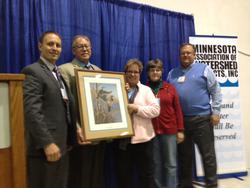On demand: Chaotic meetings lead agency to post videos

By Tom Steward | Watchdog Minnesota Bureau
MINNETONKA, Minn. — Meetings of the Minnehaha Creek Watershed District won’t give “Parks and Recreation” a run in the ratings, but a few viewers would be nice.
“Just so we don’t finish last,” said MCWD interim administrator Jeff Spartz. “The other watershed district (Rice Creek) that has videotapes of its meetings available typically gets under a dozen hits a month.”
The obscure agency’s meetings premiere on YouTube in December.
“Our Council came to the unanimous conclusion that televising MCWD board meetings would be an enormous benefit to our residents, City Council and city staff, not to mention a significant benefit to all the other communities in the Watershed,” Deephaven Mayor Paul Skrede said in a letter to the agency.
Nine cities asked it to start televising their proceedings after MCWD board meetings took a dramatic turn earlier this year.
“In this day and age, we feel government agencies, like the MCWD that have a significant impact on residential and economic activities, should take every opportunity to be as transparent in their operations as practically possible,” wrote Independence Mayor Marvin Johnson.
Minnesota’s 45 watershed districts serve as special-purpose, local units of government with taxing authority to deal with water related issues. Headquartered in suburban Minnetonka, MCWD was named 2013 Watershed District of the Year by the Minnesota Department of Natural Resources. A state audit found MCWD to be a “highly functioning, high achieving, and proactive organization” in spending nearly $13 million of local taxpayer funding.
But “highly embarrassing” may be more apt for this year’s report. The top administrator’s surprise firing, a walkout and boycott by some board members, a shouting match between a board member and taxpayer and public document requests all led to hiring a third-party facilitator to get MCWD back on track.
A resolution of “no confidence in the current board to conduct the business of the district based on the principles of good governance and fiduciary responsibility to the citizens living within the district” came from the Citizens Advisory Committee.
“I keep telling the staff this is something you’re going to tell your grandchildren about. This is not a normal way of life for an organization,” said Spartz, a veteran government manager. “In my 47 years, this is the first time I’ve encountered something like this.”
The decision to televise board meetings came at the request of City Councils and residents in the name of increased transparency.
“We just feel some people have asked for it, and that’s enough reason to go ahead and do it,” said Bill Bushnell, chair of MCWD’s Citizens Advisory Committee. “Let’s be transparent, let’s be open. Let’s make those tapes available.”
ON-DEMAND: After winning the state’s top award in 2013, the MCWD underwent a shake-up, leading to a no-confidence vote by citizen volunteers, a boycott by some board members and more transparency, including on-demand video of meetings.
The transition should be seamless; a camera is already mounted in the ceiling of the agency’s recently remodeled board room.
“I would imagine it would be fairly low in the beginning. Who knows, maybe word will get out and there will be viewing parties, watershed district viewing parties,” said Telly Mamayek, MCWD communications director.
The only other watershed district to televise its meetings typically draws a handful of views online. The most recent November board meeting has logged one view to date.
“I myself haven’t had much feedback on it, except from time to time folks seem to have knowledge that would seem to indicate they heard something there or read our minutes,” said Phil Belfiori, Rice Creek Watershed District administrator.
The MCWD meeting videos will be posted on the agency’s YouTube channel, alongside other listings on macro invertebrate sampling, zebra mussels and storm water. The biggest blockbuster so far? “Installing a Permeable Paver Driveway,” with 48,800 views over three years.







